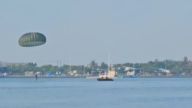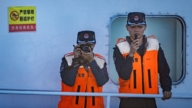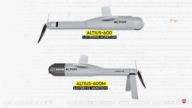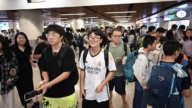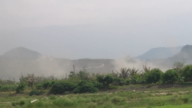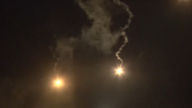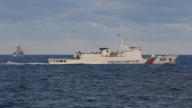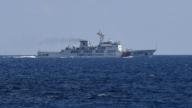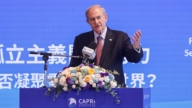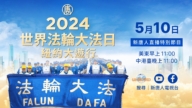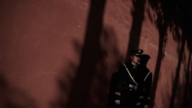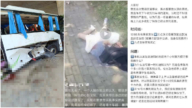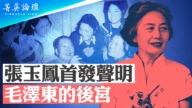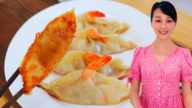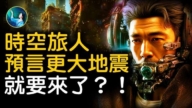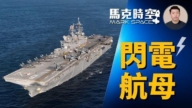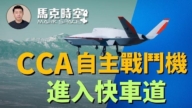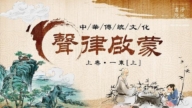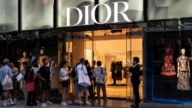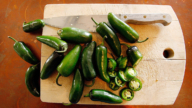【新唐人2014年02月20日訊】日前,台灣「陸委會」主委王郁琦和大陸「國臺辦」主任張志軍在南京會談,這是自1949年以來,兩岸政府最高級別官員的正式會談,也讓兩岸分開60多年的政治問題,再次成為輿論關注的熱點。有學者指出,台灣與北京過於靠近,實際上是在「與狼共舞」。
備受關注的「王張會」13號在上海落幕。台灣「陸委會」主委王郁琦和大陸「國臺辦」主任張志軍,自11號在南京會談後,再一次上海重逢,併進行了長達兩個多小時的會談。
美國前哥倫比亞大學訪問學者、政治分析家陳破空:「台灣的當權者跟中共走近,這個不僅違背了和中國人民抗共的潮流相反,而且,跟世界圍堵中共的國 際形勢也相反,因為中共現在跟周邊國家是四面樹敵,四面楚歌,沒有一個國家喜歡中共,它跟周邊國家交惡,顯示了一個獨裁政權的一個霸權嘴臉,這樣的情況下,我就說台灣,也就是說現在的台灣當權者,是在與狼共舞。」
儘管兩人談判內容,僅限於事務性問題,但是,避免政治議題的「王張會」,被指暗含政治議題,就是為未來「馬習會」鋪路。
在台灣的「中華民國」現任總統馬英九,還有兩年半的任期,據了解,馬正在謀求自己的「歷史定位」,急於在任期內實現「馬習會」,並想藉此逆轉自己低於一成的民意支持。
不過,美國前「哥倫比亞大學」訪問學者,政治分析家陳破空認為,馬英九正確的歷史定位,應該是放下個人的私心,站在捍衛台灣尊嚴,堅守民主正義這邊,不應與剝奪中國民眾基本人權的中共獨裁者站在一起。
中共當局在「王張會」前夕,就上演了一齣野蠻、無禮的戲:拒絕台灣《蘋果日報》及美國《自由亞洲電臺》駐臺記者簽證。
陳破空:「這種跟台灣民主體打交道的時候,卻打壓民主,排斥新聞自由,而且是選擇性排斥,擺明就是一副流氓嘴臉,就是一個強盜邏輯:順我者昌,逆我者亡。兩岸都還沒有統一,中共就已經如此明目張膽,在兩岸交流與對話過程中,大刀砍殺新聞自由,如照此發展下去,如果兩岸統一,台灣落入中共掌控之下,台灣的民主與自由,豈不遭受大劫大難?」
按理,為了捍衛新聞自由,王郁琦應退席抗議,但馬政府委曲求全,仍派王郁琦出席「王張會」。陳破空認為,這次會談,幾乎淪為對獨裁者的投降之旅。
旅美時事評論員張健:「他(馬英九)應該閉門思過,應該怎麼樣來提高台灣在國際社會上的地位,這個作為他是應該考量的,如何提高台灣同胞在大陸的權益,這是馬英九應該做的,而不是派出這樣的高規格的一個代表團,和中共狼狽為姦在一起。」
學者指出,「國臺辦」事前表示「王張會」不觸及政治議題,會後發佈的新聞稿,卻將「反對臺獨」與「堅持九二共識」變成兩岸官方共識,而現場的「陸委會」主委王郁琦沒有表示反對,甚至回臺後,也不見在野黨提出質疑譴責,後續的國際效應,令人擔憂。
抗日戰爭結束後,國民黨與共產黨之間的矛盾日益激化。1945年10月10號,雙方談判,並簽署了「雙十協定」。
當時,共產黨耍盡欺騙手段,邊談邊打,假談真打,在國民黨主席蔣介石與中共領導人毛澤東談判的41天中,中共搶奪國軍城池超過兩百多座。
而號稱「對台灣讓利」的ECFA會議簽訂後,台灣經濟並無起色,反而持續低迷。經濟不振,成為馬英九政府的硬傷。
時隔六十多年,共產黨再度色誘國民黨。人們希望,馬英九政府能夠明辨是非,切莫與虎謀皮,最後吃虧上當,竹籃打水一場空。
台灣社團呼籲在野黨,嚴肅看待「王張會」效應,敦促國會儘快通過《兩岸監督條例》,為兩岸談判做好把關。
採訪編輯/常春 後製/李勇
Cross Strait Meeting: Taiwan Dances with Wolves
The recent Shanghai meeting between Taiwan’s Mainland
Affairs Council Minister Wang Yu-chi and China’s Director of
Taiwan Affairs Office of State Council, Zhang Zhijun, was the
highest level of official talks between the two governments
since 1949.
This meeting also bought up the more than 60 years of cross
Strait political issues.
Taiwan’s move to get close contact with Beijing is commented
on as “Dances with Wolves".
The 2 hour-meeting between Wang and Zhang ended on the
13th in Shanghai.
This is their second meeting after their first meeting in Nanjing
on the 11th.
Chen Pokong, political analyst: “Taiwan authorities’ close
contact with the Chinese Communist Party (CCP) is not only
violating the anti-Communism of the Chinese people, but also
opposing international containment of the CCP.
The CCP is besieged on all sides. The neighboring countries
have all regarded it as the enemy, for its dictatorship and
hegemonic attitude in the world political arena.
Under such circumstances, I would say Taiwan, i.e., the Taiwan
authorities, is dancing with wolves."
Although the agenda of the meeting was business, political
issues are generally believed to imply and pave the way for
future leadership meetings between the two sides.
Taiwan’s incumbent President Ma Ying-jeou, with his
remaining two and a half years of term, is seeking his
“historical position" and ambitious to reverse the less than
10% public support by pushing forward his meeting with the
CCP leader, Xi Jinping.
Political analyst Chen Pokong comments that Ma Ying-jeou
needs to put aside his personal interest, defend Taiwan’s dignity
and uphold democracy and justice to earn his historical position,
rather than standing side by side with the CCP, the dictator
who deprives Chinese of basic human rights.
Right before the meeting, the CCP staged a brutal and rude drama:
Reject reporter visa to journalists of Taiwan’s Apple Daily and
Radio Free Asia of America.
Chen Pokong: “This is obviously CCP’s gangster logic: Live if
obey, die if disobey.
They deal with the democratic entity, Taiwan, but suppress
democracy and freedom of the press. It is a selective rejection.
The two sides are not unified yet, the CCP is already so blatant
during the dialogue and exchanges cross Strait, by killing press
freedom.
Should this be allowed to continue, once the two sides are unified,
Taiwan falls under the control of the CCP, Taiwan’s democracy
and freedom are bond to disastrous damages."
Logically, in order to defend freedom of the press, Wang Yu-chi
should have withdrawn in protest.
However, the Ma administration compromised and Wang Yu-chi
still attended the meeting.
Chen Pokong comments that the meeting signals Taiwan’s
surrender to the dictator.
Zhang Jian, political commentator: “What Ma Ying-jeou should
do is to ponder over his mistakes and think hard how to improve
Taiwan’s position in the international community and elevate
Taiwan people’s rights in China.
This is what he should do, rather than sending a delegation of
high specification to work hand in glove with the CCP."
Accordingly, China’s Taiwan Affairs Office had indicated that
no political issues are involved in the meeting, but the press
release after the meeting stated the consensus in the meeting,
“oppose Taiwan independence", and “insist on 1992 consensus".
Not only did Wang Yu-chi show no objection against the claims
at the meeting, but also the opposition parties in Taiwan did not
question or condemn the statement.
Commentators are concerned with the subsequent international
effect of these claims.
After WWII, the conflict between the Kuomintang (KMT)
and the CCP was increasingly intensified.
On October 10, 1945, both parties negotiated and signed the
“Double Tenth Agreement."
At that time, the CCP deceived the KMT by false talk and real hit.
During the 41 days of negotiation between KMT Chairman
Chiang Kai-shek and CCP leader Mao Zedong, the CCP conducted
real battle against the KMT and occupied more than 200 KMT
military bases.
After the signing of the Cross-Strait Service Trade Agreement
(ECFA), Taiwan’s economy has not only kept sluggish, rather
than picking up as promised by the ECFA, but also become a
flaw to Ma Ying-jeou’s government.
60 years later, the CCP once again deceived the Kuomintang.
It is hoped that the Ma administration can tell right from
wrong, and refrain from attempting the impossible.
Otherwise, Ma will finally lose the entire nation.
Taiwan’s opposition parties are also called upon by society to
seriously pay attention to the after effect of this official meeting
of both sides, and urge the Congress to pass the “Regulations
on Cross Strait issues" to guard the negotiations across the Strait.
Interview & Edit/ChangChun Post-Production/LiYong


